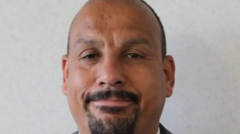Did the Councillor's Rally Comments Cross the Line?

Understanding the Context of Controversial Speech: The Case of Ricky Jones
The recent trial of Ricky Jones, a Labour councillor, has sparked significant debate regarding the boundaries of political speech, freedom of expression, and the implications of inciting violence. During an anti-racism rally in Walthamstow on August 7 last year, Jones made remarks that have landed him in court, leading to discussions about the appropriate responses to extremist ideologies. As we delve into the details of this case, it is essential to understand the broader implications of such incidents in our society.
The Incident That Sparked Controversy
At the rally, Jones described far-right protesters as "disgusting Nazi fascists" and made a statement that has been interpreted as inciting violence. His comments were captured on video, leading to public and legal scrutiny. In defending his statements, Jones claimed that his remarks were "ill-advised" and not meant to be taken literally. This defense raises critical questions about the interpretation of political speech and the responsibilities of public figures.
Background on Ricky Jones
Ricky Jones, aged 58, was a full-time official for the Transport Salaried Staffs Association (TSSA) union at the time of the incident. His political background and involvement in anti-racism efforts underline the complexity of his situation. Jones has been described by friends as a peaceful individual, which adds layers to the understanding of his controversial statements. Kevin Courtney, a retired teacher and friend of Jones, expressed surprise at the comments, stating that they were "completely out of character."
The Nature of Political Speech
This case highlights the fine line between passionate political expression and the potential for inciting violence. Political rhetoric can often be heated, especially in contexts involving racism and extremism. However, it is crucial for public figures to navigate these waters carefully to avoid misinterpretation and the risk of promoting violence.
Legal Ramifications and Public Reaction
Jones has been charged with encouraging violent behavior, a serious allegation that could have significant consequences for his political career and personal life. The legal proceedings involve examining the intent behind his words and whether they could reasonably be interpreted as inciting violence. Public reaction to the trial has been polarized, reflecting broader societal divisions on issues of race, extremism, and the limits of free speech.
Defining Intent in Speech
One of the critical issues in Jones's defense is the question of intent. He argued that his comments were specifically directed at a past incident involving a 'National Front Rights for Whites' sticker found on a train, which allegedly contained a hidden razor blade. This context is essential, as it speaks to the emotional charge that can accompany political speech, particularly when tied to real-life threats of violence.
Public Figures and Accountability
The case of Ricky Jones raises important questions about accountability for public figures. Should there be a higher standard for elected officials when it comes to their speech? The potential for influence over the public and the responsibility that comes with such influence cannot be understated. Striking a balance between free expression and responsible speech is crucial for maintaining a healthy democratic discourse.
Impacts on Anti-Racism Movements
Jones's remarks and the subsequent trial could have broader implications for anti-racism movements. Activists may fear that passionate expressions of dissent could lead to legal repercussions, potentially stifling important conversations around race and extremism. It is vital for movements to find ways to express their beliefs and values without crossing into dangerous territory.
Public Sentiment and Media Coverage
The media coverage surrounding this trial has played a significant role in shaping public opinion. The portrayal of Jones's comments, the context of the rally, and the response from the community all contribute to how this incident is perceived. Coverage can influence societal attitudes toward both the individuals involved and the broader issues at hand, highlighting the power of media in shaping narratives.
Key Takeaways from the Trial
As the trial of Ricky Jones continues, several key takeaways have emerged, which can provide insight into the intersection of politics, law, and social movements:
- The Importance of Context: Understanding the context of political statements is crucial. Jones's comments must be viewed through the lens of his intentions, the environment of the rally, and the broader social issues at play.
- Balancing Free Speech and Responsibility: Public figures must navigate the complexities of free speech while being mindful of their influence on society. The challenge lies in advocating for causes without resorting to language that could be interpreted as inciting violence.
- Impact on Activism: The fear of legal repercussions may inhibit activists from speaking out passionately against injustices. Finding ways to communicate dissent without crossing legal boundaries is vital for the effectiveness of social movements.
- Public Perception Matters: How incidents like these are portrayed in the media and perceived by the public can have lasting impacts on the individuals involved and the movements they represent.
Frequently Asked Questions
What were Ricky Jones's controversial comments about?
Ricky Jones referred to far-right protesters as "disgusting Nazi fascists" during an anti-racism rally, which led to his arrest and trial for allegedly encouraging violent behavior.
What is the defense argument in this case?
Jones's defense claims that his remarks were taken out of context and not intended to incite violence. He stated that his comments were related to a specific incident involving extremist materials found on a train.
What are the implications of this trial on free speech?
The trial raises important questions about the limits of free speech for public figures, especially in political contexts where emotions run high and the potential for misinterpretation exists.
How does this case impact anti-racism movements?
Jones's case may deter activists from expressing their dissent passionately due to fear of legal consequences, which could hinder the effectiveness of movements aimed at combating racism and extremism.
What can we learn about political rhetoric from this case?
This case underscores the necessity for public figures to communicate responsibly, balancing passionate advocacy with the potential consequences of their words.
As we reflect on the complexities of this trial, it becomes clear that the intersection of politics, speech, and social justice remains a contentious and critical area for discussion. How can we navigate the challenges of expressing dissent while ensuring that we do not cross boundaries that could lead to violence? This case serves as a reminder of the responsibilities that come with public discourse. #PoliticalSpeech #AntiRacism #FreedomOfExpression
Published: 2025-08-14 15:48:13 | Category: sport


